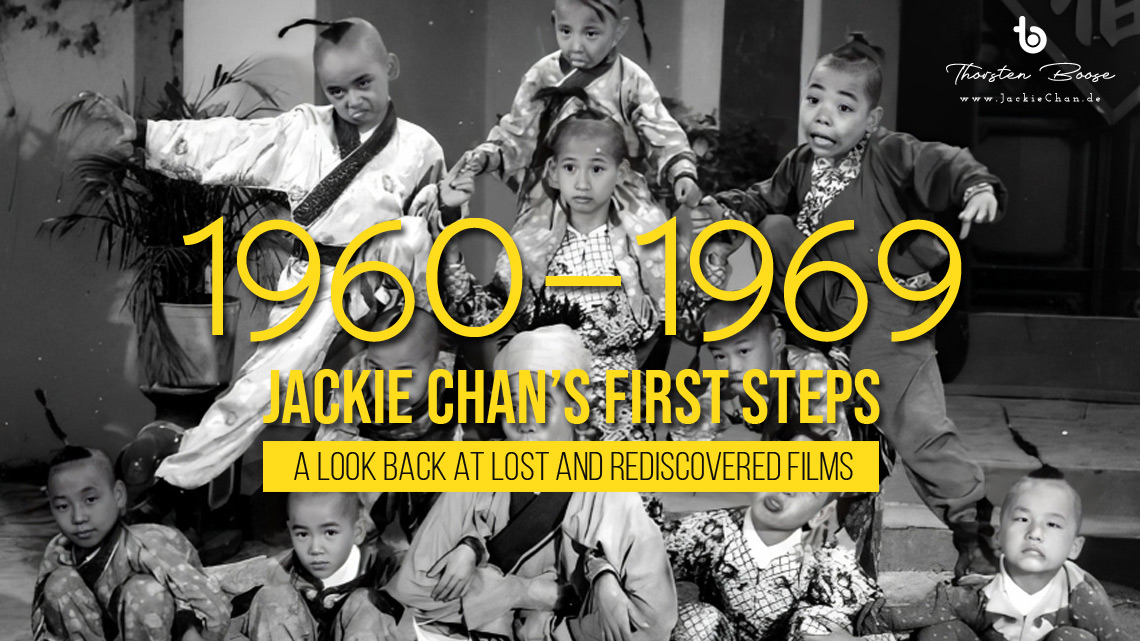
1960-1969: Jackie Chan’s first steps – A look back at lost and rediscovered films
It is well known that Jackie Chan was already in front of the camera at the age of eight and played a small role in the film “The 7 Tyrants Of Jiangnan” (1963), also known as “Big And Little Wong Tin Bar”. During his education at the China Drama Academy under Yu Jim-Yuen, he and his classmates were often loaned out to film studios to generate additional income for the school’s coffers.
A few other films from the 1960s with Jackie Chan are also known, a few of which were handed down incorrectly and do not show the young Chan. But there are even films in which attentive fans might suspect Jackie Chan. But what if Jackie himself confirmed these films and even did so more than 30 years ago?
Review of previous articles on the 60s
I myself have been a fan of Jackie Chan since childhood and since then have always kept an eye out outside his official filmography for references or actual appearances by him that were not yet known, or at least not to me. Even a star can make mistakes. Over the years and decades, I – like other fans – have been able to make a small contribution every now and then to clearing up a complete* filmography of Jackie Chan.
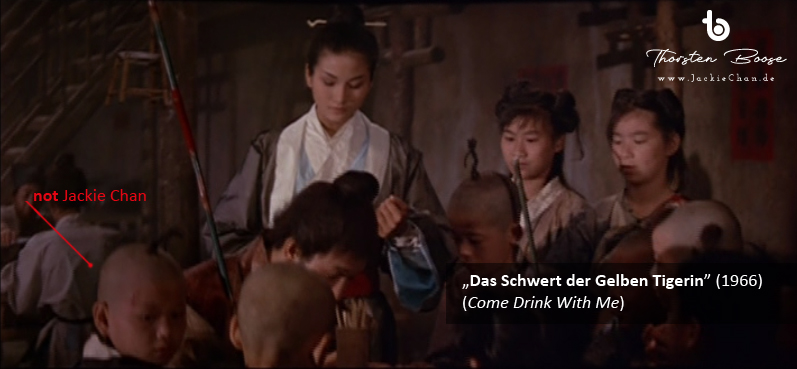
Back in 2017, I wrote a comprehensive report about the misinformation that Jackie was supposed to have had a role in the famous King Hu film “Come Drink With Me” (1966). In reality, it was the film “Lady Of Steel” (1970), also with Cheng Pei-Pei and also from Shaw Bros. The report can be read here.
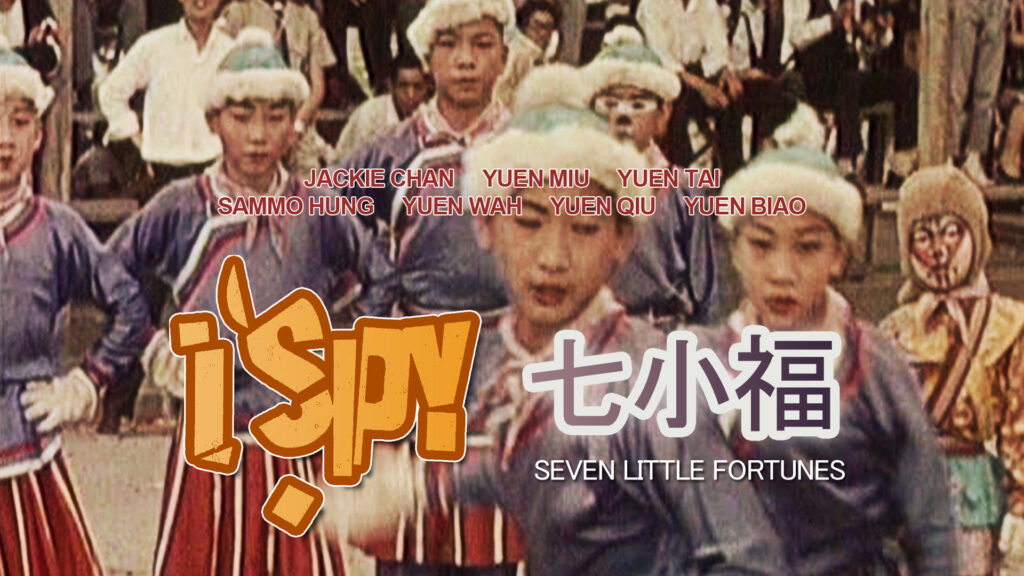
I also reported on a unique appearance in a US TV series with Bill Cosby and Robert Culp. An amazing testimony from Hong Kong. Read it here.
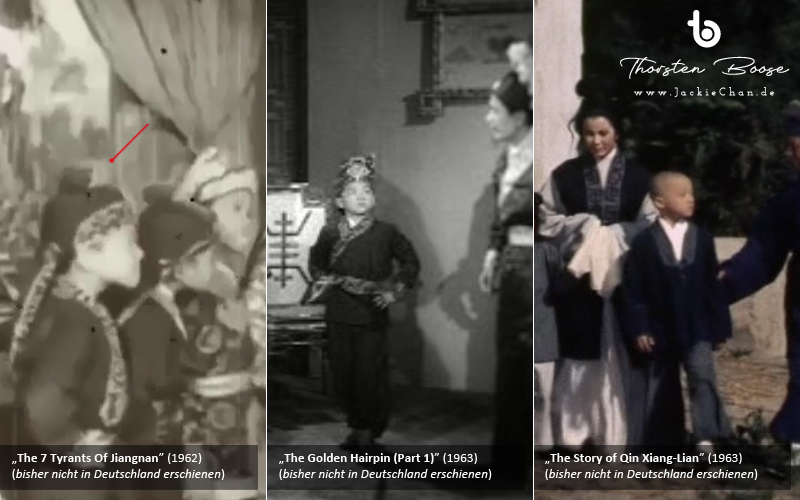
And since my inner Monk often drives me to look even closer, I recorded my research findings on the four-part “The Golden Hairpin” (1963, 1964) back in 2018 in the report “Discovery: Jackie Chan discovered in “The Golden Hairpin” from 1963 thanks to a comparison of film recordings?” (to be read here). I will come back to this film later.
So what other films has Jackie Chan confirmed and when is that supposed to have been?
* Compiling a complete filmography of Jackie Chan will be almost impossible, as there are not verifiable records for every film in which he participated.
Status Quo: The confirmed films of the 60s
Let’s take a small step back and first establish the status quo. The following films are confirmed to date with Jackie Chan’s collaboration. If not by Jackie himself, then by means of available, unambiguous videos, photos and/or official entries in databases of the Hong Kong Film Archive.
„The 7 Tyrants Of Jiangnan“ (1962, 橫掃江南七霸天)
„The Story Of Qin Xiang-Lian” (1964, 秦香蓮)
„The Eighteen Darts (Part 1)” (1966, 兩湖十八鏢(上集))
„The Eighteen Darts (Part 2)” (1966, 兩湖十八鏢(下集))
All the films mentioned above were never released in English. The two entries about “Come Drink With Me” (1968), see my report linked above, and “The Love Eterne” (1963) are both wrong. I will go into more detail on the latter in a moment.
In addition, there are rumours about dozens of other films from the 60s that Jackie Chan was supposedly present during the filming. The later in the 60s, the more likely as a stuntman and extra and no longer as a child actor. These are the assumptions.
Even if it is quite reasonable to assume that Jackie took part in other films, because according to his statement there were already dozens of films at that time, one should still be careful when researching. Because as already mentioned, even a star can make mistakes.
1989 on Celebrity Talkshow
In the case of Jackie Chan’s narration on Celebrity Talkshow on 16 June 1989 (available in the “Armour Of God” box set of 88 films as bonus material with English subtitles), however, he seems to remember his filming days as a child and adolescent in great detail. In the programme with presenters Chua Lam, Ni Kuang and James Wong, Jackie even talks about how he worked with Ti Lung on “The Water Margin” (1972).
That will be a separate article, because I discovered a lot here that I have to report about in detail! For those who are already interested in the topic, I refer you to my podcast episode of 9 April 2022 “Jackie Chan & Chang Cheh: WATER MARGIN and other confirmed films from the 60s”.
Only in German, sorry, but YouTube’s auto generated subtitles work pretty good sometimes.
He is also asked what films he made as a child. And that’s where it gets exciting. He mentions “The Mermaid” (1965, 魚美人), which was never released in English, and in fact there have been hints among fans for many years, probably because of this very statement from back then, that he had worked in the film. Herewith I first make the direct reference to a statement by Jackie himself and name the source, so that it is comprehensible why one should devote oneself to the film as a fan. There are only a few scenes with children, especially at the end. One of the costumed acrobatic children could very well be Jackie.
The second film Jackie mentions in the talk show is “Monkey Soldiers Come To The Rescue” (1963, 猴子兵華山救駕), also never released in English, in which clearly a young Sammo Hung makes one of his first appearances. Here, too, an even younger Jackie Chan, who was already making films at the time, is difficult or impossible to recognise – because the children in the film all wear monkey costumes.
Last but not least, Jackie proudly tells us that he also starred in a film adaptation of a classical Chinese opera called “Butterfly Lovers”. One of the presenters asked in astonishment whether it was the famous film “The Love Eterne” (1963, 梁山伯與祝英台) with Betty Loh Tih and Ivy Ling Po from Shaw. But Jackie just waved it off confidently and explained that it was the Cathay adaptation from the year before with Li Li-Hua, “The Romance Of Liang Shanbo And Zhu Yingtai” (1964, 梁山伯與祝英台). You guess right – this film was never released in English either.
This makes perfect sense, because Li Li-Hua, as the story goes, was enthusiastic about Jackie’s work at the time and continued to enjoy working with him, as he did the following year in the well-known film “The Story Of Qin Xiang-Lian” (1964, 秦香蓮). The Shaw adaptation of the “Butterfly Lovers” folklore has been more successful and remains a classic to this day. The Cathay version, “The Romance Of Liang Shanbo And Zhu Yingtai” (1964, 梁山伯與祝英台), has been lost to time, which means it is probably lying in a basement archive somewhere awaiting rediscovery and digitisation.
In May 1994, Li Li-Hua, then approaching 70, paid a visit to Hong Kong. She spent her twilight years in America and Singapore, but Jackie Chan threw a reunion dinner in her honour, where they both talked about the good old days with guests. They even came up with the idea of performing a Peking Opera together on stage for a charity event.
The whole thing was printed in detail in the Fan Club booklet #53 on pages 32 and 33. Jackie also mentions the 1964 “Butterfly Lovers” film here.
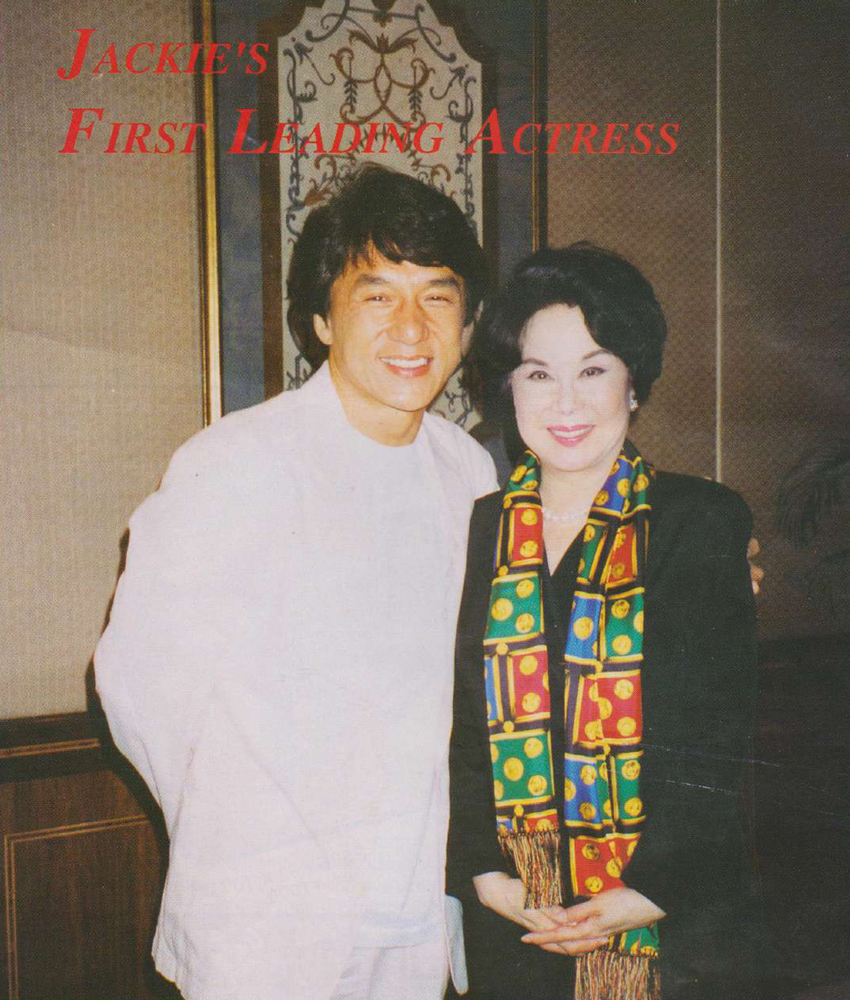
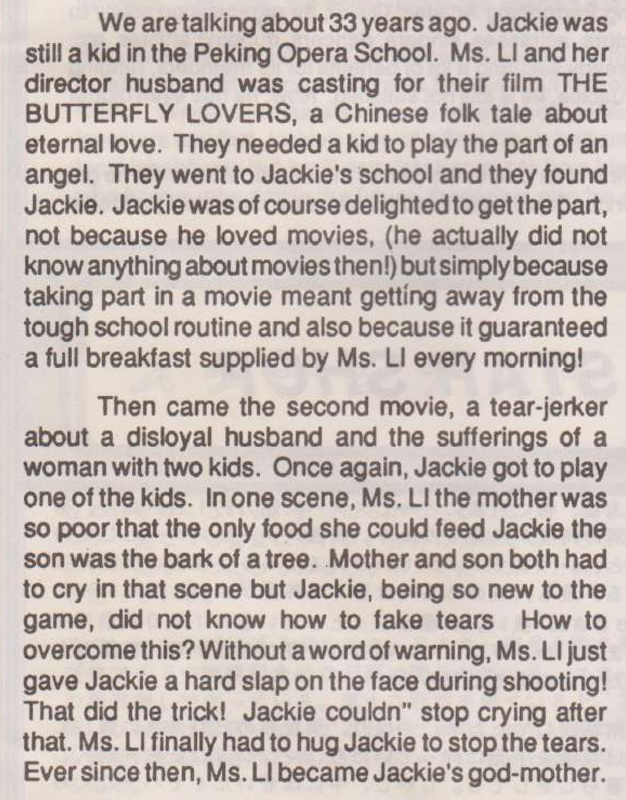
1990 in an exclusive book interview
The late 1980s and early 1990s was a time of many exclusive interviews for Jackie, who had just gained international recognition for the first time as a drama film producer with his film “Rouge” (1988, 胭脂扣) and wanted to prove to the world with “Miracles” (1989, 奇蹟) that he, as a serious filmmaker, could also create art in his genre that would have a lasting interest for a large audience. For author Chen Qing-Wei (陳清偉), he gave such an exclusive interview for his book series of Hong Kong film stars.
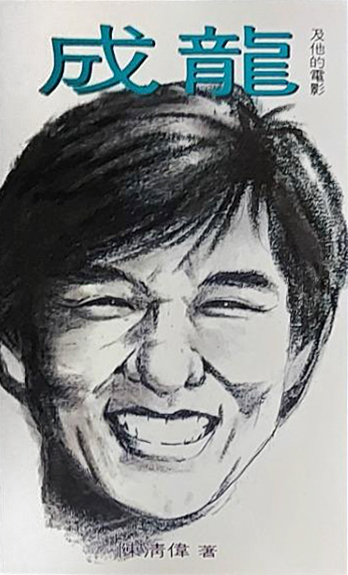
Chen Qing-Wei wrote a book called “Jackie Chan And His Films” (成龍及他的電影), which was published only in Chinese by the Hong Kong Film Publishing House (香港電影出版社) in 1990. The book itself can be thought of as a mixture of biography, filmography and interview. On about 170 pages in paperback format, the author retells the story of Jackie’s parents and their new start in Hong Kong, of Jackie’s childhood days and years at the China Drama Academy, of his first attempts as a stuntman and so on.
Today, these stories about Jackie Chan are world-famous, not least thanks to his autobiography “Jackie Chan – A Life of Action”, published in the West in 1998. What many people don’t know is that, strictly speaking, this is his second autobiography. Because back in 1984, to be precise on 29 February, the book “愛してポーポー” (Love You, Paw Paw) was published in Japanese, which is considered Chan the Man’s first autobiography. To this day, there is no translation of this book, but it forms the basis for everything that was subsequently reported biographically about Jackie Chan.
To go back a few more years, we have to bring Jackie’s former manager Willie Chan († 2017) into play, who created a perfectly functioning marketing clockwork around his protégé by handing out prescribed anecdotes about Jackie Chan to the press as early as the late 1970s, which were printed and repeated over and over again in the official fan club and its booklets as well as in the much-cited “My Childhood” stories (the origin of which was again an exclusive newspaper report in Hong Kong).
So in 1989/1990, all the staff around Jackie Chan and he himself had already been briefed on how to answer certain questions uniformly. I have all the more respect for journalistic work like that of Ni Kuang, Chua Lam and James Wong as well as Chen Qing-Wei, who asked questions outside the preconceived image. Don’t get me wrong, I think the anecdotes from Jackie’s life are authentic, albeit embellished, but in order not to offer the press a point of attack and damage one’s own image, one naturally has to repeat the same stories above a certain level.
In the book “Jackie Chan And His Films” (成龍及他的電影), however, Jackie goes briefly astray and addresses the question of how many and which films he starred in as a child.
„I was already training at school at the age of seven. A year later I was in the film “The Story Of Qin Xiang-Lian” alongside Li Li-Hua.“
„Jackie Chan And His Films“ (成龍及他的電影), page 61
On page 61 in the book Jackie lists a few films from the 1960s, some he mentioned on the Celebrity Talk Show a year earlier, but there were surprises too.
„… then came “Liang San Poh and Chu Ing Tai”, “Big And Little Wong Tin Bar”, “Monkey Soldiers Come To The Rescue” and “The Golden Hairpin”. There were at least 50 or 60 films.”
„Jackie Chan And His Films“ (成龍及他的電影), page 61
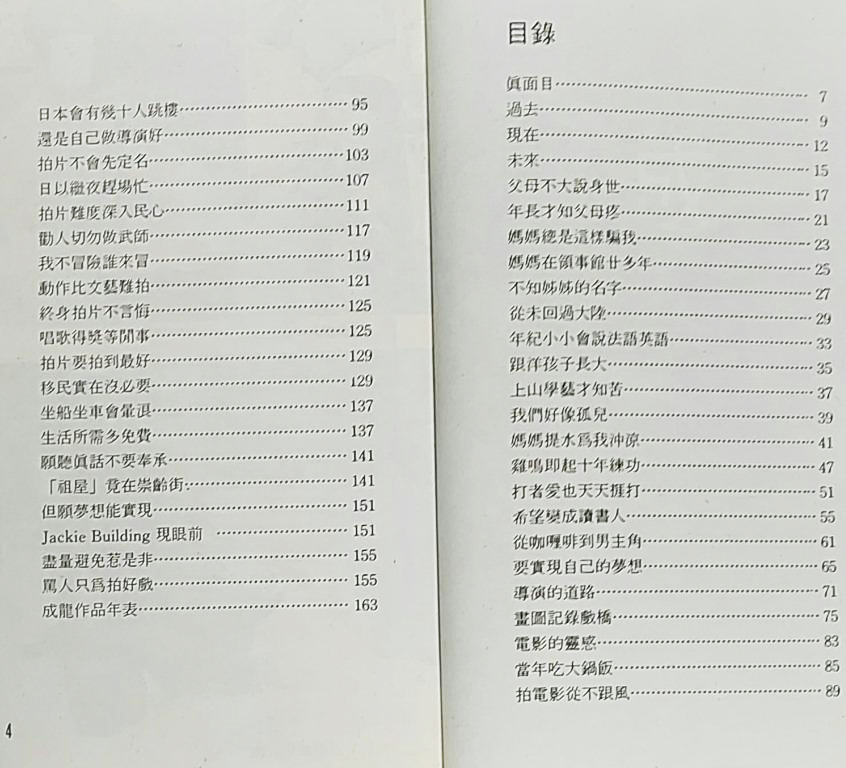
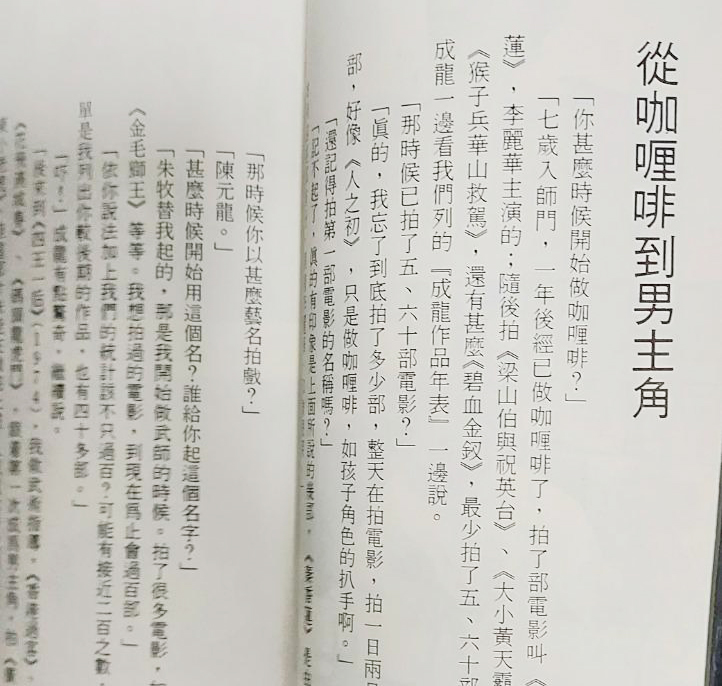
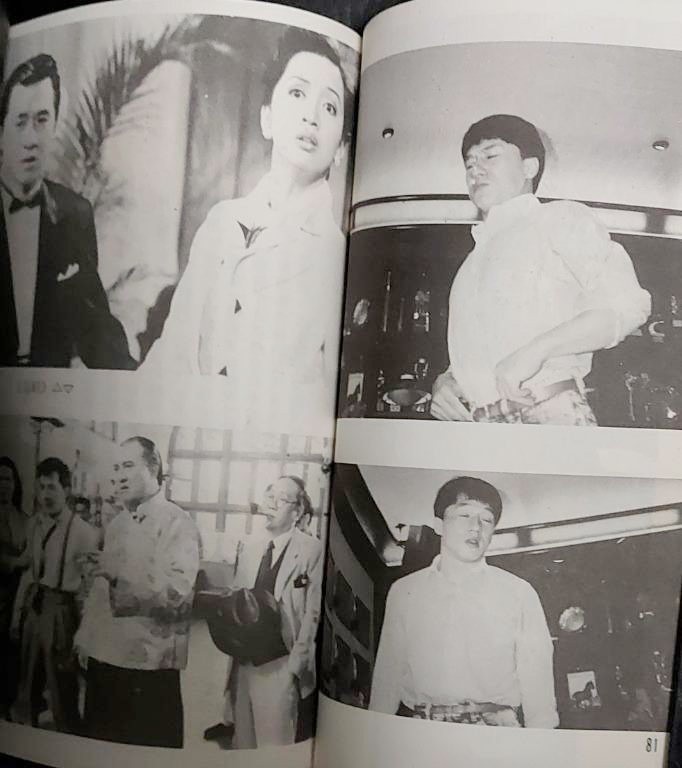
The statement that Jackie had already made 50 or 60 films as a child shocked author Chen Qing-Wei, so he asked. Jackie confessed that he didn’t know exactly how many films there were because there were so many and he sometimes worked on two different ones a day or was on a new set every two days. The mass production of 7-day films is a subject in itself and surely there are more films with Jackie Chan in a child role lying dormant somewhere, but for us it is amazing to note here and now that Jackie once again confirmed films that are still rumoured today.
And not only that. It tells of a film that hardly anyone associates with Jackie Chan. Probably because it was never mentioned again and is still considered lost today.
„I’ve forgotten how many films I’ve done. […] In “Father And Son” I only played one of the pickpockets for a short time.“
„Jackie Chan And His Films“ (成龍及他的電影), page 61
Status Quo supplemented by newly discovered films
The following films were confirmed by Jackie Chan himself in 1989 and 1990:
„The Mermaid“ (1965, 魚美人)
„Monkey Soldiers Come To The Rescue“ (1963, 猴子兵華山救駕)
„The Romance Of Liang Shanbo And Zhu Yingtai“ (1964, 梁山伯與祝英台)
„The Golden Hairpin“ (1963, 1964, 碧血金釵)
„Father And Son“ (1963, 人之初)
He does not give any information about which part of the quadrology around “The Golden Hairpin” Jackie is ultimately to be seen in. But I think my article on this already linked above provides some information.
Jackie as a pickpocket in “Father And Son”?
Much more exciting at this point is the last mentioned film from 1963, “Father And Son” (人之初). Although it seems to have been lost over the decades, a film booklet has survived surprisingly well. Here, in Chinese and English, the project is brought closer to the reader, with photos.
Could there be a young Jackie Chan in one of these photos? Just think, at the time of filming he had probably just turned nine. The film booklet mentions by name Baby Wong Pui-Pui (小佩佩), a popular child actress of the 1960s, and Teng Hisao-Yu (鄧小宇), who is the focus of the following photos.
Three of the boys are bald, which may actually indicate that they came from the China Drama Academy. One of them even resembles Yuen Miu and the other Jackie Chan – his smile almost speaks volumes, doesn’t it?
I permitted myself at highlighting the possible candidate for Jackie Chan. To enlarge the photos, please click on the respective image.
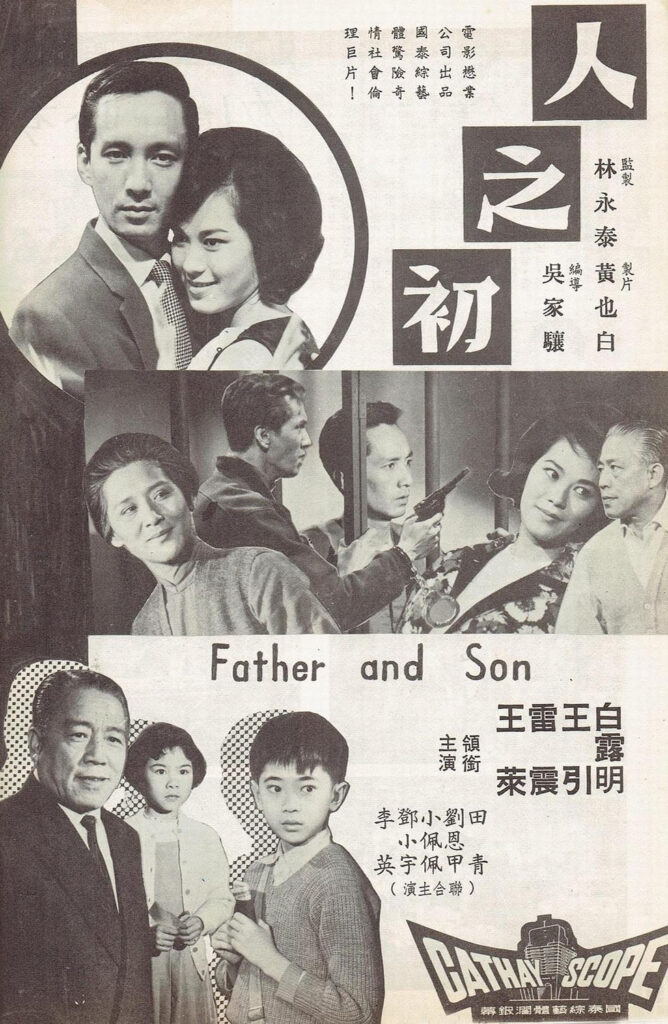
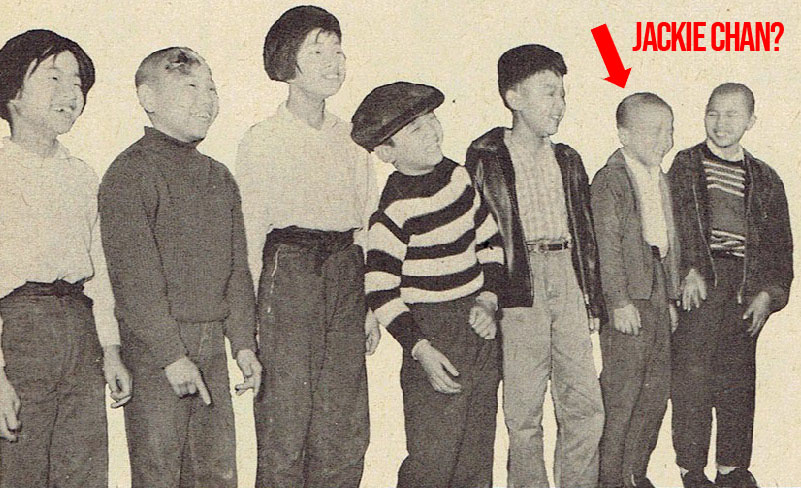
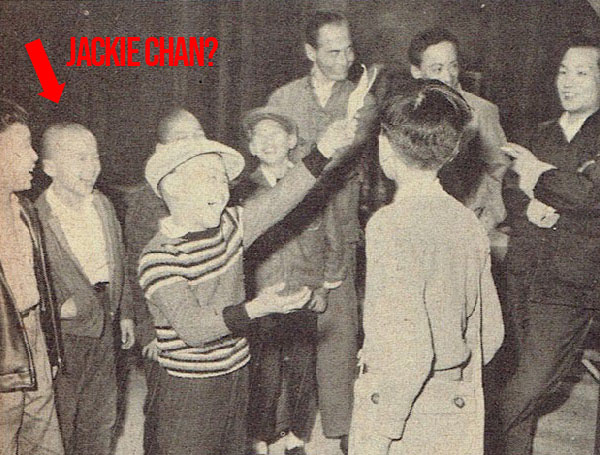
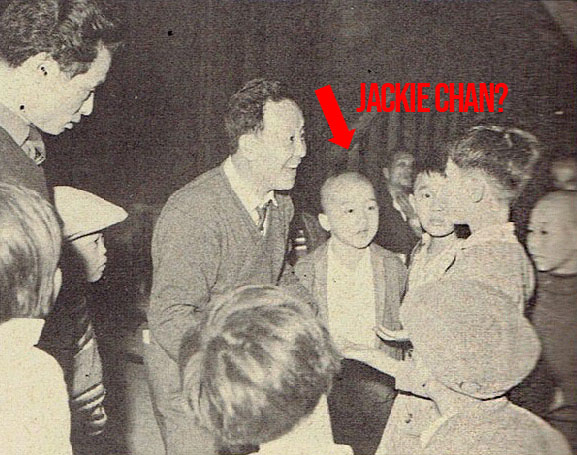
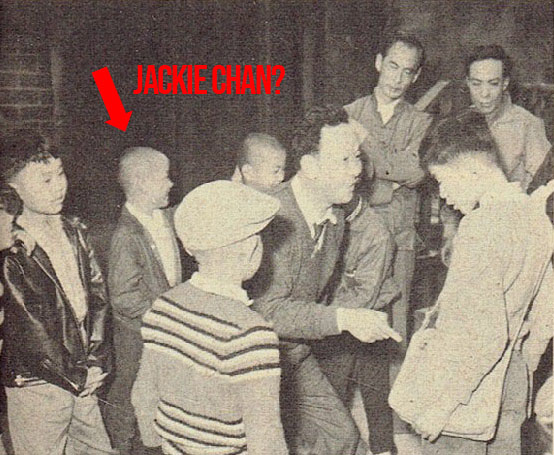
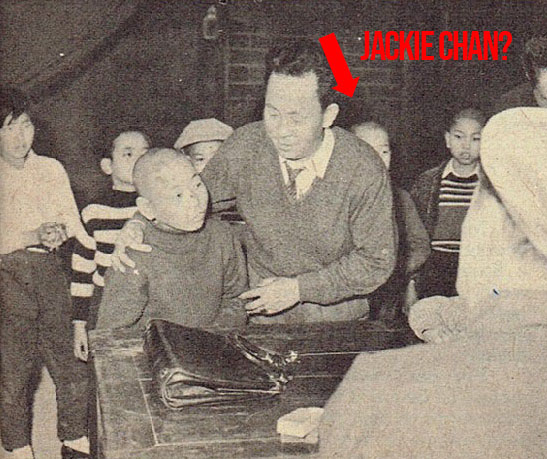
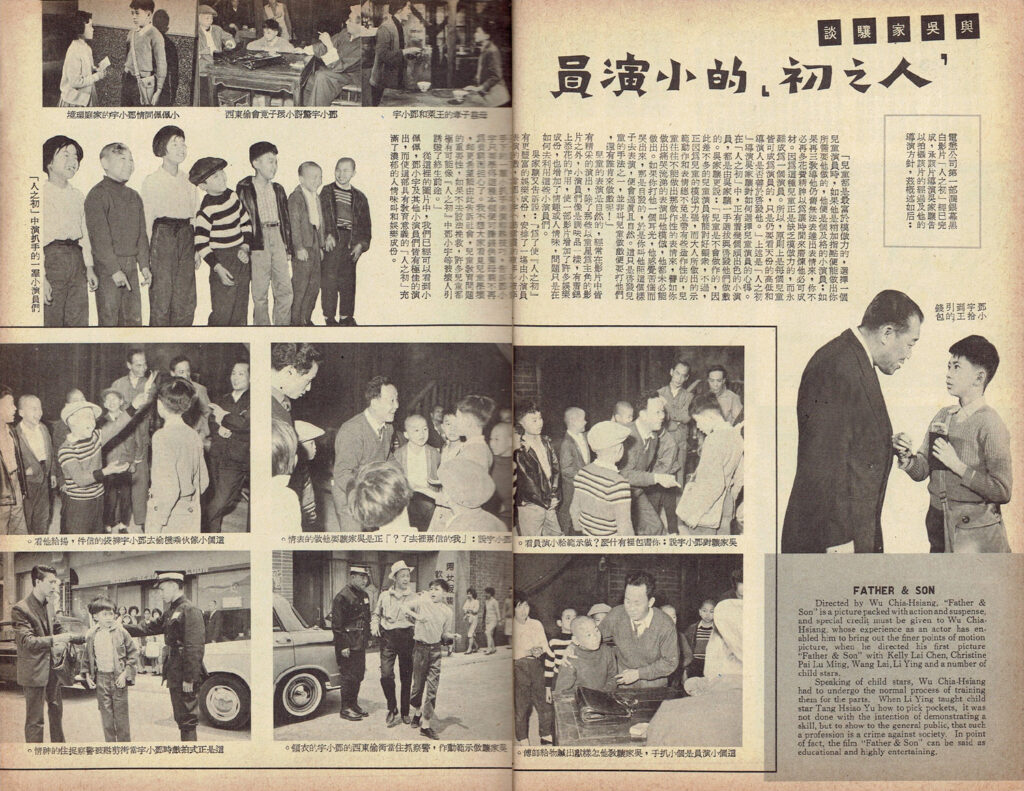
Jackie Chan with the Seven Little Fortunes in “Passion”?
While researching “Father And Son” (人之初), I happened to come across a photo with a caption in old magazines that puzzled me at first. The photo shows, in poor quality, a performance of a Chinese opera. The text to it says:
„In the new film “乾柴烈火”, a scene within a scene is shot and the Seven Little Fortunes perform a Beijing opera.“
The Kung Sheung Evening News, 24 April 1964 (工商晚报)
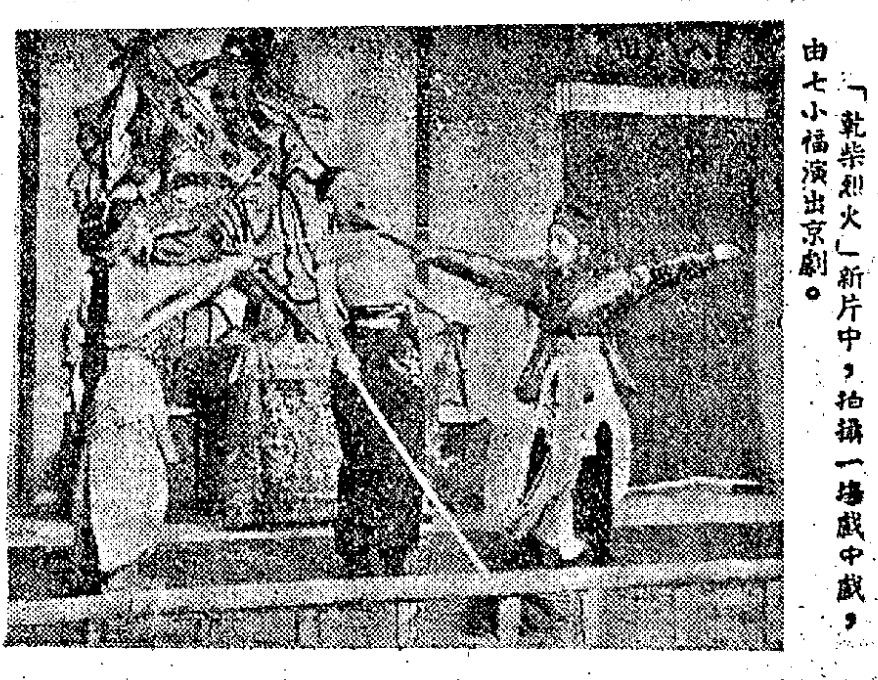
The Seven Little Fortunes? Is that Jackie Chan in the photo? And what does this have to do with “Father And Son” (人之初)? I think nothing. Coincidence played a role here, because the title “乾柴烈火” is a film that was renamed during the dubbing – to “女人女人”. At least that’s what a magazine from 1963 wrote.
“The dubbing of the literary tragedy “女人女人” has been completed. The original title “乾柴烈火” has been changed in the meantime.”
Overseas Chinese Daily News (华侨日报), 14 November 1964
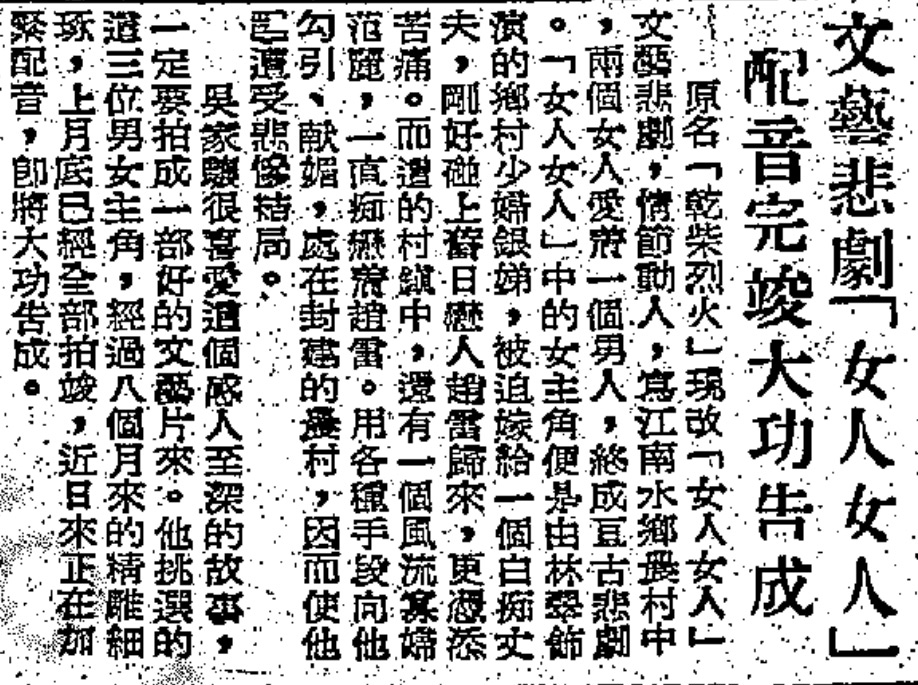
And if you search for this title, you come across the film “Passion” (女人!女人!), which was apparently produced in 1964 and premiered in Taiwan on 2 December 1965 (in Hong Kong only on 31 March 1967) and, guessed right, never released in English either.
So were the Seven Little Fortunes filmed during one of their performances for the film “Passion” (女人!女人!)? That would be a real sensation and, after the Bill Cosby series “I Spy”, the second sensational find of a real performance by the Seven Little Fortunes!
Fun Fact: Director Wu Chia-Hisang (吳家驤) directed both “Father And Son” (1963, 人之初) and “Passion” (1965, 女人!女人!).
Would you like a little more?
For the sake of completeness, I must mention Seven Little Fortunes here. Because as such, the top team of Yu Jim-Yuen’s China Drama Academy also got film credits. This is what happened in “Little Dragon Girl Teases White Snake Spirit” (1963, 小龍女三戲白蛇精) and “The Invincible Kid Fong Sai-yuk” (1965, 無敵神童方世玉). The second even stars Simon Yuen Siu-Tin, who was a teacher at Jackie’s school. It could well be that these two films also feature a young Jackie.
Apparently, there are also films that show the Seven Little Fortunes – or some members of the team – but do not mention them in the opening/closing credits. One such film is “The Birth Of Yue Fei” (1962, 岳飛出世), which unmistakably features a young Sammo Hung. This photo was taken on the film set and also shows, among others, Yuen Wah and Jackie Chan, all gathered around the leading actor Sai Gwa-Pau.
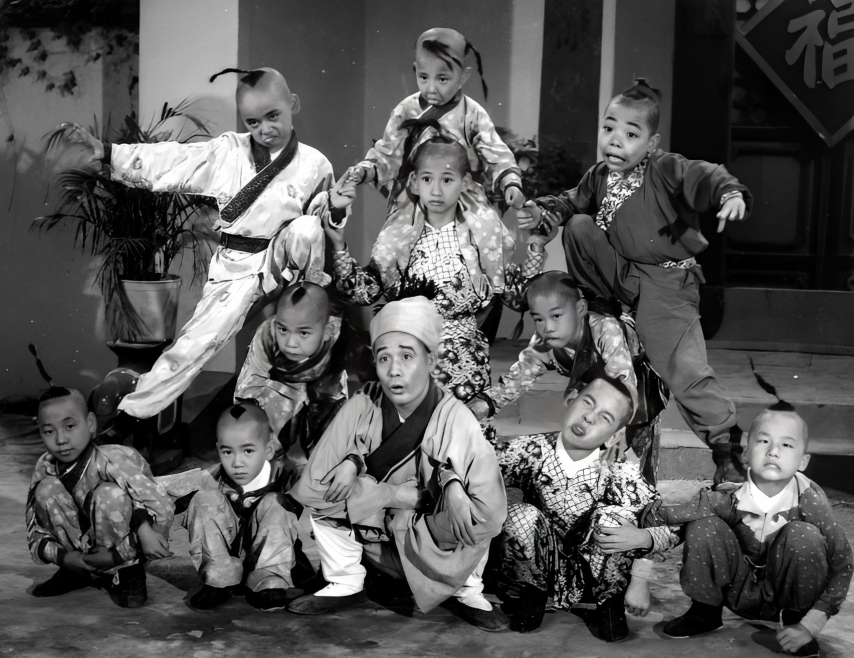
The film is based on the Chinese book “General Yue Fei” (說岳全傳), which was written in the 17th century by Qian Cai (錢彩) and begins with a scene of the boys in a school and ends with Sammo Hung’s already impressive arts of Chinese opera and martial arts. In the film there is then a temporal leap into the future and from here on no more children appear. Jackie Chan (also Yuen Wah) are not seen in the film. But the photo was already printed in the official film booklet in the 1960s.
Sammo Hung is mentioned by name in the booklet, Jackie Chan is not. I myself have a few questions here. Were Jackie’s scenes cut out or not used, or not filmed at all? Was he only on the set to gain first experience? After all, the film came out before “The 7 Tyrants Of Jiangnan” (1962, 橫掃江南七霸天), Jackie’s first official movie. Or were different films shot that day and they just met for a group photo?
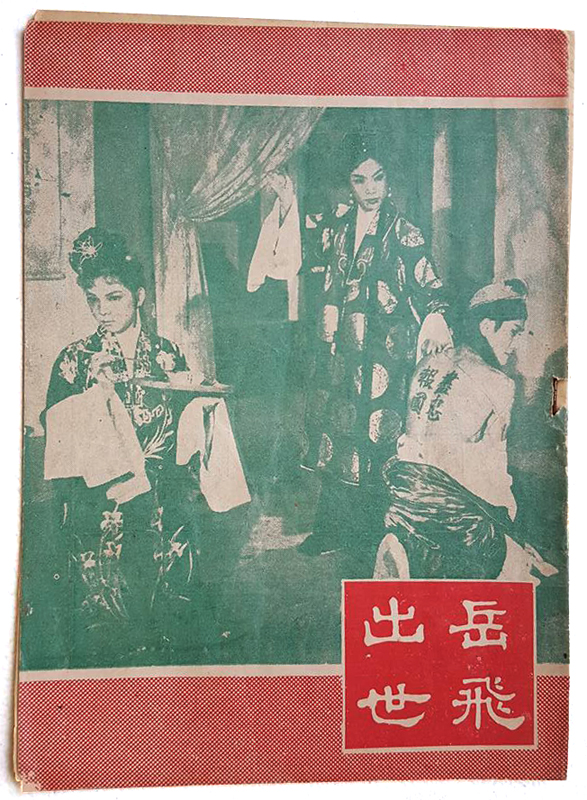
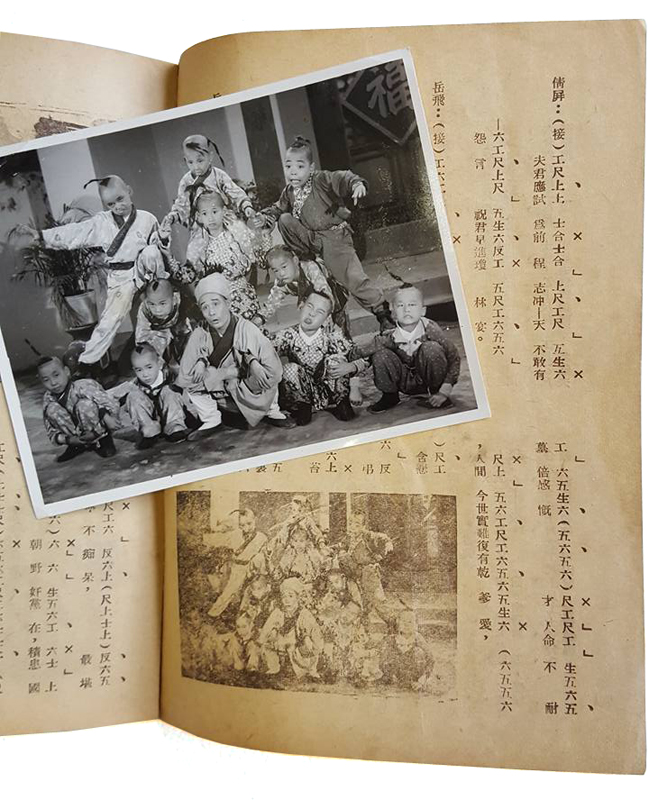
These questions remain open for the time being. Perhaps we will discover more films in the future that list the Seven Little Fortunes as a credit.
Another rumour says that Jackie Chan was involved as a stuntman in the King Hu film “Dragon Inn” (1967, 龍門客棧) thanks to Sammo Hung. However, this could not be confirmed so far. Neither has Jackie Chan’s statement that he and other stuntman colleagues were involved in the 1966 US film “The Sand Pebbles” (in an interview with Inside Kung Fu Magazine in 1999, an excerpt can be read online here). It is possible, however, less easy to verify visually, and here Jackie’s words could easily be misunderstood. Even Hong Kong film insider Mike Leeder elaborates on this in Dan Benamor’s podcast “Movies I Love That No One Talks About”, 17 July 2021, titled “Jackie Chan Spectacular” (listen here).
“The Magnificent Monk” (1969, 濟公活佛) has long been listed in the Hong Kong Movie Database with Jackie Chan as the screenwriter. In fact, the film’s opening credits feature the name Sing Lung (成龍), but in 1969 Jackie Chan was still far away from having that name, let alone his first self-written film script.
Last but not least, Jackie is said to play one of the younger swordsmen in the film “The Swordmates” (1969, 燕娘), seen at a gate in the background. As I wrote at the beginning, be careful when researching!
Filmography 1960-1969 with explanations
In order to bring my research results finally to the point, I will conclude by listing all the films I have reviewed here in chronological order by first release with a note and add other films that have not been mentioned so far but belong to this era.
🟢 = confirmed by JC 🟡 = to be checked 🔴 = no reference
10 November 1960
🔴 The World of Suzie Wong
The book “Dying For Action” lists Jackie Chan with a cameo and uses an incorrect year (1964). Definitely no reference to Jackie, he wasn’t even at the China Drama Academy in 1960.
27 September 1962
🟡 The Birth of Yue Fei | 岳飛出世
A group photo of actor Sai Gwa-Pau was printed in the film booklet, showing Jackie Chan at the edge of the picture. Maybe his scenes were cut out/not used or not shot at all?
5 December 1962
🟢 The 7 Tyrants Of Jiangnan | Big And Little Wong Tin Bar | Seven Little Valiant Fighters | 橫掃江南七霸天
Jackie Chan’s first official film
29 January 1963
🟡 Little Dragon Girl Teases White Snake Spirit | Little Dragon Girl and Lady White Snake | 小龍女三戲白蛇精
The Seven Little Fortunes receive a credit. The film is considered lost. Jackie Chan’s possible involvement must be examined, but is conceivable.
6 March 1963
🟢 Monkey Soldiers Come To The Rescue | The Grateful Monkey | 猴子兵華山救駕
Jackie Chan confirms the film on the Celebrity Talk Show as well as in the book „Jackie Chan And His Films“ (成龍及他的電影).
3 April 1963
🔴 The Love Eterne | Eternal Love | 梁山伯與祝英台
No involvement of Jackie Chan. See above in the text. Has been mistaken for “The Romance Of Liang Shanbo And Zhu Yingtai” (1964, 梁山伯與祝英台). During the promotion of “RIDE ON” (2023), an official video was shared on Weibo showing fan interviews interspersed with Jackie’s footage. One shot references a person from this film who is definitely not Jackie Chan.
15 August 1963
🟢 Father And Son | 人之初
Jackie Chan confirms the film in the book “Jackie Chan And His Films” (成龍及他的電影).
28 August 1963
🟢 The Golden Hairpin (Part 1) | 碧血金釵(上集)
Jackie Chan confirms the film in the book “Jackie Chan And His Films” (成龍及他的電影), but he does not name the exact part. According to my research (see my article here), it should be parts 1 and 2.
4 September 1963
🟢 The Golden Hairpin (Part 2) | 碧血金釵(下集)
Jackie Chan confirms the film in the book “Jackie Chan And His Films” (成龍及他的電影), but he does not name the exact part. According to my research (see my article here), it should be parts 1 and 2.
19 July 1964
🟢 The Story Of Qin Xiang-Lian | 秦香蓮
Li Li-Hua, according to her own statement, hit Jackie before the start of filming a scene to make him cry real tears.
24 December 1964
🟢 The Romance of Liang Shanbo and Zhu Yingtai | Liang San Poh and Chu Ing Tai | 梁山伯與祝英台
The Cathay film version with Li Li-Hua is considered lost. Jackie Chan confirms the film both in the Celebrity Talk Show and in the book “Jackie Chan And His Films” (成龍及他的電影).
29 January 1965
🟢 The Mermaid | 魚美人
Jackie Chan confirms the film on Celebrity Talk Show.
12 February 1965
🟡 Passion | 女人!女人! | 女人女人
A newspaper report says that the Seven Little Fortunes were filmed for this movie during one of their performances. The working title was “乾柴烈火” until the dubbing. A possible participation of Jackie Chan has to be checked, but is considered conceivable.
30 June 1965
🟡 The Invincible Kid Fong Sai-yuk | Fong Sai-yuk, an Unrivalled Boy | 無敵神童方世玉
The Seven Little Fortunes receive a credit. The film is considered lost. Jackie Chan’s possible involvement has to be checked, but is considered conceivable. A photo could show Jackie with other children next to actor Sai Gwa-Pau on the set.
10 November 1965
🟢 I Spy
S1E9 „No Exchange on Damaged Merchandise”; real performance by the Seven Little Fortunes on the birthday of Tin Hau, goddess of the sea and patron saint of fishermen. Date of recording: 25 April 1965.
7 April 1966
🔴 Come Drink With Me | 大醉俠
No involvement of Jackie Chan. See my article here.
24 August 1966
🟢 The Eighteen Darts (Part 1) | Seven Little Tigers | 兩湖十八鏢(上集)
Still considered lost.
31 August 1966
🟢 The Eighteen Darts (Part 2) | Seven Little Tigers (Part 2) | 兩湖十八鏢(下集)
Still considered lost.
20 December 1966
🟡 The Sand Pebbles
According to rumours, Jackie Chan worked here as one of many young stuntmen. I suspect that Jackie Chan is not necessarily talking about himself in the known interview, but rather for all the Hong Kong stuntmen, of which he was also one shortly afterwards.
21 October 1967
🟡 Dragon Inn | Dragon Gate Inn | 龍門客棧
According to rumours, Jackie Chan has landed a small role as a stuntman or extra thanks to Sammo Hung.
1 March 1969
🔴 The Magnificent Monk | 濟公活佛
No involvement of Jackie Chan. See above in the text.
27 March 1969
🔴 Dragon Swamp | 毒龍潭
No involvement of Jackie Chan. On December 29, 2017, in episode 151 of the talk show “晓说2017”, a clip made a false reference to Jackie Chan by showing this movie poster.
8 October 1969
🔴 The Swordmates | 燕娘
Most likely, Jackie Chan was not involved. This film appears from time to time in film lists without images that prove his involvement or any other sources.
I am quite sure that in the future we will rediscover the lost films, as was the case with “Big And Little Wong Tin Bar” (1962, 橫掃江南七霸天) when the film appeared online at some point as a TV recording of Chinese television.
Anyone who wants to help find films and fill in gaps in our knowledge is cordially invited to contact me.